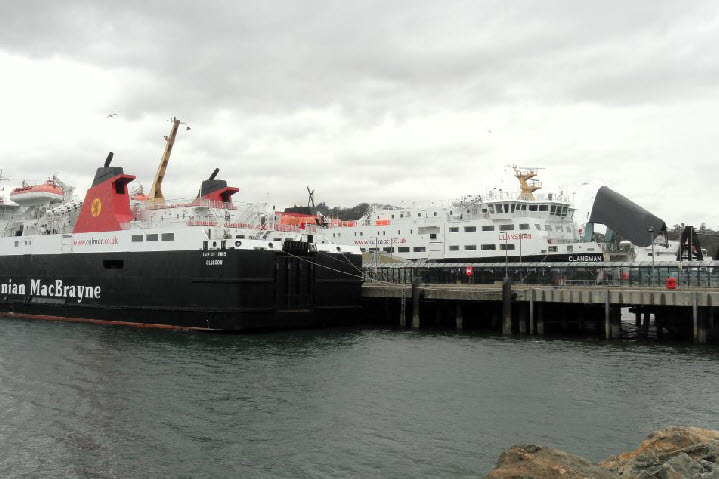CalMac set to announce reveal latest round of ferry disruption changes with new deployment
decisions
25 February 2025

CalMac is due to publish yet another revised redeployment plan following a number
of key ferries remaining out of action with serious defects.
Vessel availability details and deployment plans are expected to be advised to affected
communities in a major update.
Changes come in the shadow of a growing number of major ships removed from CalMac's
available-for-duty list.
MV Caledonian Isles has failed to operate for over a year while an area of corrosion
on MV Isle of Lewis requires replacement. At the same time MV Clansman needs additional
repairs it is believed.
Updates over the charter of MV Alfred are also expected to be provided soon. The
85-metre-long catamaran on hire from Pentland Ferries at a cost of around £1 million
a month - including fuel, berthing fees and crew wages - has proven to be an invaluable
addition to the fleet, adding resilience to the CalMac service.
There’s still no sign of the newly constructed MV Isle of Islay arriving from the
Turkey shipbuilders. The new £45 million ferry has missed the winter overhaul period.
All four ships from Turkey face delays. Delivery of MV Loch Indaal, the second new
ferry from Cemre’s yard in Yalova Province, has also been held up.
One piece of good news is MV Glen Sannox’s sterling performance since entering service
in January particularly when operating in weather conditions which have led to other
services on the network being disrupted. The Ferguson Marine-built vessel is a new
addition to the fleet with the flexibility to be deployed in a number of different
ports across the Caledonian MacBrayne network.
However, as one ship is added to the fleet another is taken away. The much-loved
MV Hebridean Isles can no longer legally undertake sailings and was removed from
service for scrapping in November due to the multi-million pound cost of bringing
her up to a safe standard.
One main concern has been the long term outage affecting MV Caledonian Isles. The
vessel which was previously based on the Arran route has not carried passengers for
over a year and her absence negatively impacts a number of west coast routes particularly
since the withdrawal of MV Hebridean Isles.
A catalogue of issues has dogged the Caledonian Isles which is laid up in Greenock.
“Highly complex” repairs to replace worn and aging steelwork in an extremely awkward
location in her engine room deck were commissioned. Both main engines were removed
to allow work to proceed.
Making matters much worse was the shock discovery of twisted metal on eight frames
- which helps provide the vessel’s structural integrity. At the time the root cause
of the damage was unexplained leading CalMac to seek the expertise of a naval architect.
A huge amount of work replacing decayed steel was undertaken.
Piling on the misery was the need for repairs to her stern tube bearings which could
not be used in their very poor condition.
MV Isle of Lewis will miss her long arranged return date to Castlebay of Tuesday
4th March. A significant amount of work is required to cut out and replace badly
corroded steel on the vessel.
With levels of ferry traffic set to rise over March communities of South Uist and
Barra will be dismayed if nothing is done to improve the present diminished service.
Relief vessel MV Isle of Mull which is shared between both islands on a reduced timetable
is banned from carrying more than 45 travellers onboard until seriously defective
emergency passenger evacuation slides are replaced.
MV Clansman has now exceeded her planned seven weeks in Birkenhead drydock for extended
repairs and maintenance. She was due on the Skye triangle route at the weekend to
release MV Hebrides for her four-week overhaul.
Any delay for extra essential works to the Clansman could have a knock-on effect
on the Hebrides and risks holding back MV Lord of the Isles returning to Lochboisdale.
The Clansman’s bow visor may also need attention at a later date it is believed.
Drydocking plans for Islay vessel, MV Finlaggan, were previously pushed back from
the original dates. Now she is due to depart in April meaning it would be midway
into a busy May before she returns. CalMac will advise if it has been successful
in adding additional capacity to the route.
CalMac’s winter’s annual maintenance pre-planned period was increased from 668 overhaul
days in 2023/24 to at least 693 days to carry out all required works in a bid to
reduce risk of in-service breakdowns.
Several vessels have been receiving an extended annual maintenance period, to meet
the requirements for a peak of scheduled maintenance and survey work, which is in
line with the problems associated with an aging fleet.

